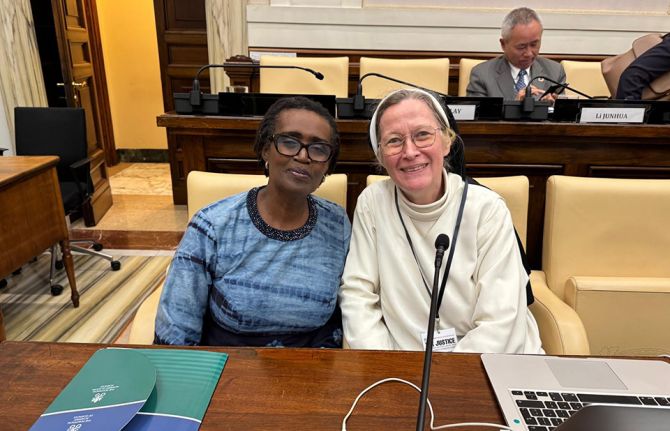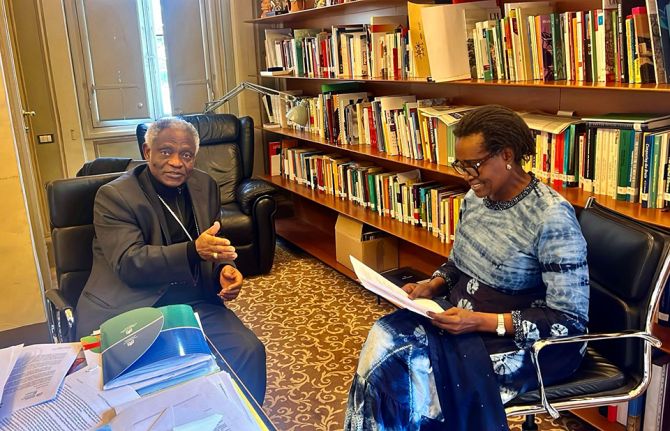


Press Release
UNAIDS rallies faith leaders in support of the HIV response at the Vatican in Rome
13 February 2025 13 February 2025ROME/GENEVA, 13 February 2025—Today, the Executive Director of UNAIDS Winnie Byanyima met with leaders in the Catholic Church as part of a global effort to mobilize voices of faith to stand up in a moment of crisis for the AIDS response.
Speaking to communities of faith at events in Vatican City Ms Byanyima said, “Two weeks ago, the world’s biggest AIDS relief programme was paused. 20 million people living with HIV rely on the United States Government for the medication they need to stay alive and prevent HIV infection. A humanitarian waiver was issued allowing some lifesaving medicines to be distributed. That is welcome. But the programme’s future remains uncertain.”
HIV clinics around the world have shuttered and HIV prevention and treatment programmes have been derailed. Without funding from the United States, within four years, 6.3 million people will die and 8.9 million will newly acquire HIV. Around 370 000 babies will acquire HIV, and without treatment, half will not live to see their second birthday.
The AIDS movement has been through this before. When people were dying from neglect in the early days of HIV in Africa, Asia, and Latin America it was the churches that stepped up to care for the sick and dying. Catholic Leaders have called urgently for the restoration of HIV programmes and other crucial international funding.
“The church has a powerful voice that reaches into communities around the world,” said Ms Byanyima. “We need the voice of faith and the leadership of faith in the world that we are in today–this time to defend the global AIDS response and lifesaving programmes like PEPFAR. Human life is sacred–and today, it hangs in the balance.”
The AIDS response has recently been presented with a game-changing opportunity. In 2024, Gilead announced that its breakthrough medicine lenacapavir can prevent HIV with injections just twice a year. If made available and affordable to all in need, this could present the opportunity to end what has been the deadliest pandemic in generations.
“Humanity has made incredible progress tackling AIDS. But let me be clear. Without funding for the HIV response, we risk losing all we have gained and could see a resurgent AIDS pandemic. And if we want national governments to plug the gap, we must give them the means to do so and support a sustainable transition,” said Ms Byanyima.
Even before the US announcement, the AIDS response had a financing gap of US$ 9.5 billion. UNAIDS estimates that US$ 29.3 billion is needed to get countries on track and end the AIDS pandemic by 2030.
“That is why at the Vatican today we are also focused on enabling low- and middle-income countries to raise domestic funding for the HIV response. Proper taxation and relieving the crushing burden of debt are critical.”
UNAIDS will continue to partner with the United States, other donors and countries most affected by HIV to ensure a robust and sustainable response to HIV and to achieve our collective goal of ending AIDS as a public health threat by 2030.
UNAIDS is documenting the Impact of recent U.S. shifts on the global HIV response online.
UNAIDS
The Joint United Nations Programme on HIV/AIDS (UNAIDS) leads and inspires the world to achieve its shared vision of zero new HIV infections, zero discrimination and zero AIDS-related deaths. UNAIDS unites the efforts of 11 UN organizations—UNHCR, UNICEF, WFP, UNDP, UNFPA, UNODC, UN Women, ILO, UNESCO, WHO and the World Bank—and works closely with global and national partners towards ending the AIDS epidemic by 2030 as part of the Sustainable Development Goals. Learn more at unaids.org and connect with us on Facebook, Twitter, Instagram and YouTube.
